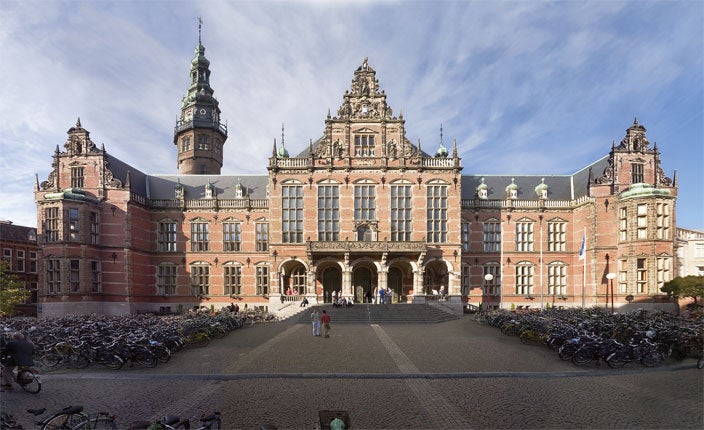Groningen, University of

Your support helps us to tell the story
From reproductive rights to climate change to Big Tech, The Independent is on the ground when the story is developing. Whether it's investigating the financials of Elon Musk's pro-Trump PAC or producing our latest documentary, 'The A Word', which shines a light on the American women fighting for reproductive rights, we know how important it is to parse out the facts from the messaging.
At such a critical moment in US history, we need reporters on the ground. Your donation allows us to keep sending journalists to speak to both sides of the story.
The Independent is trusted by Americans across the entire political spectrum. And unlike many other quality news outlets, we choose not to lock Americans out of our reporting and analysis with paywalls. We believe quality journalism should be available to everyone, paid for by those who can afford it.
Your support makes all the difference.Age: 397
History: The University of Groningen was founded in 1614 and is one of Europe’s oldest universities. From the start the University was internationally oriented; the first Rector Magnificus, Ubbo Emmius, hailed from Germany, while almost half of the students came from outside the Netherlands. Back in 1614, the four main areas of teaching and research were Law, Medicine, Theology and Philosophy. Nowadays the university offers programmes in virtually every field.
Address: The University of Groningen is scattered over the city of Groningen, but the main university buildings are located in the Groningen city centre and on the Zernike campus, north of the city centre. The University address is: Broerstraat 5, 9712 GL Groningen.
Ambience: The University has a visible presence in the city, with the historic buildings in the city centre, the University Medical Centre and the groundbreaking architecture of the universtiy buildings at the Zernike campus. The city is very much suited to the lifestyle of students and young people. One in five inhabitants is a student, and over half the population is under 35, making Groningen Holland’s youngest city.
Vital statistics: The university educates around 28,000 students, of whom 3,800 are international. There are over 90 degree programmes taught in English
Added value: High quality education and research, in English, combined with an international experience that will benefit you for the rest of your life, in one of the best student cities in the Netherlands.
Easy to get into? That depends on the programme. A few undergraduate programmes (Psychology, International Business & Management, and International Relations & International Organization) have a ‘numerus fixus’, meaning there are a limited number of seats. Some postgraduate programmes are highly selective (such as the Erasumus Mundus, Research and Top Masters programmes) and only accept the top students. For all other programmes, if you meet the admission requirements, you will be likely to be admitted.
Are there scholarship opportunities? Yes, more information is available here. Additionally, UK students are in some cases eligible for Dutch Study finance or a Dutch government grant - check here to find out more.
Glittering alumni: Aletta Jacobs, the first female student in the Netherlands; Wim Duisenberg, first president of the European Central Bank; Hans Wijers, CEO of the Board of Management of AkzoNobel; Peter Rehwinkel, mayor of Groningen; several members of the Dutch Royal Family and Junkie XL of Elvis-remixing fame!
Transport links: Every city in the Netherlands is well connected by bus and train. From the UK, fly to Schiphol Airport. There is a direct train every hour from Schiphol airport to Groningen.
Who's the boss? The University of Groningen Rector Magnificus is Professor Dr Elmer Sterken (Econometrics) and the Chairman of the Board of the University is Professor Dr Sibrandus Poppema (Medicine).
Overall ranking: Ranked 120th in the 2010 QS World Universities Ranking.
Nightlife: Groningen is the best student city in the Netherlands, and was ranked as the European city with the highest quality of life by its inhabitants 2006. There are 50,000 students studying in the city, so you can be sure there’s always something to do. Most students describe the city as relaxed, compact, lively, very safe and very much geared towards the student way of life. The city centre is compact and is bursting with bars, restaurants, shops, galeries, cinemas and theatres.
Cost: Tuition fees are extremely cheap, weighing in at an approximate €1,720 per year.
Any accommodation? For international students, the Housing Office, a non-profit organization acting as intermediary, will help you find temporary furnished housing. Like every Dutch student city, housing is scarce and in many cases not cheap. All international student houses employ student managers to welcome new students and act as caretakers. Matching Dutch student accommodation, the facilities include a private bedroom, shared kitchen/bathroom/living rooms, full furniture and free wireless internet. Average rent per month works out as about £330. More information.
Cheap to live there? Groningen is one of the cheaper cities in Holland, with living expenses roughly comparable to those in England - apart from London. Expect to pay €300-500 per month on rent, €200-250 on food, €75-100 on health insurance, around €300 per semester on books, and €100-450 on a language course.
Prospectus: http://www.rug.aspin.nl/formulier.asp?lang=en; +31-50-363 8181; chat@rug.nl
Join our commenting forum
Join thought-provoking conversations, follow other Independent readers and see their replies
Comments